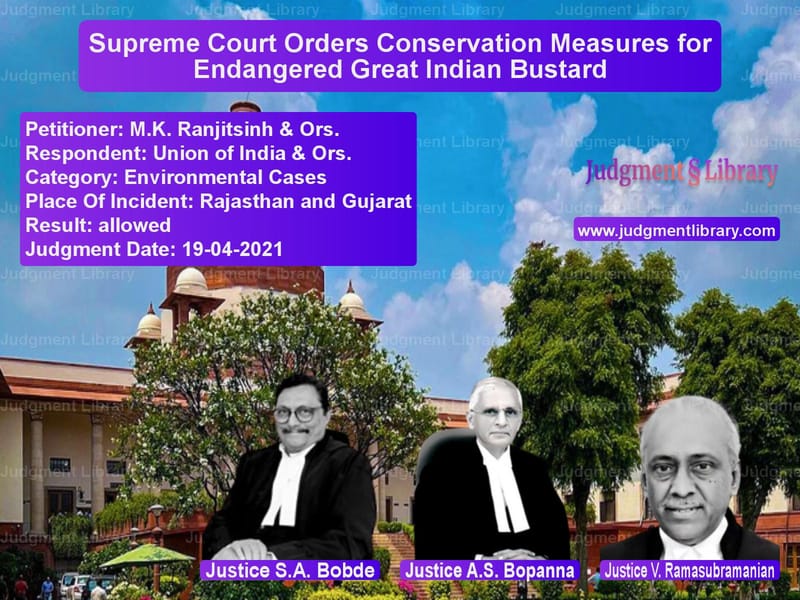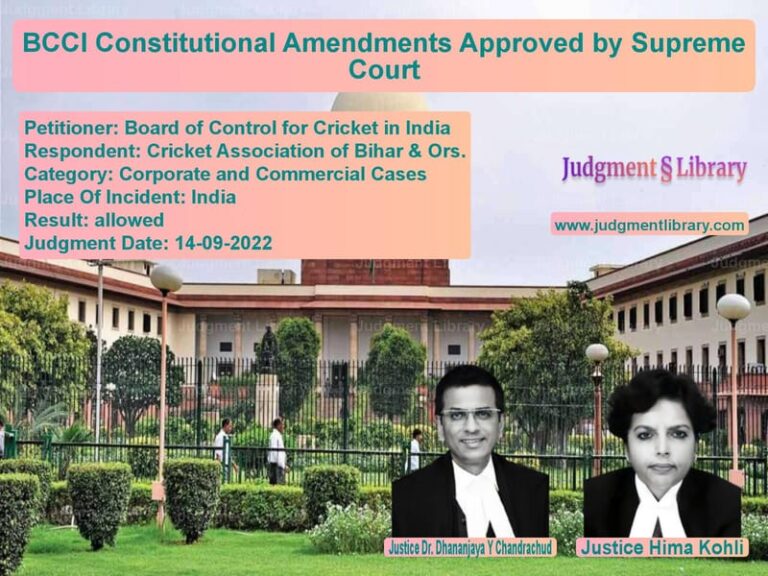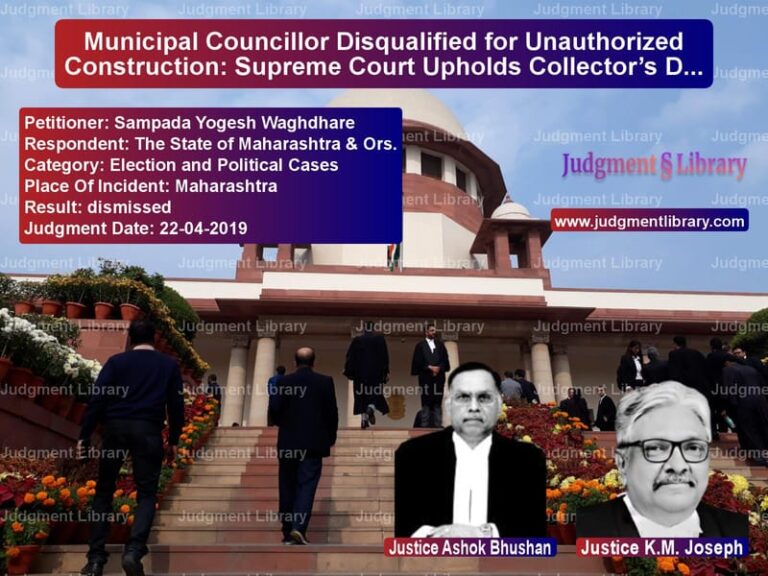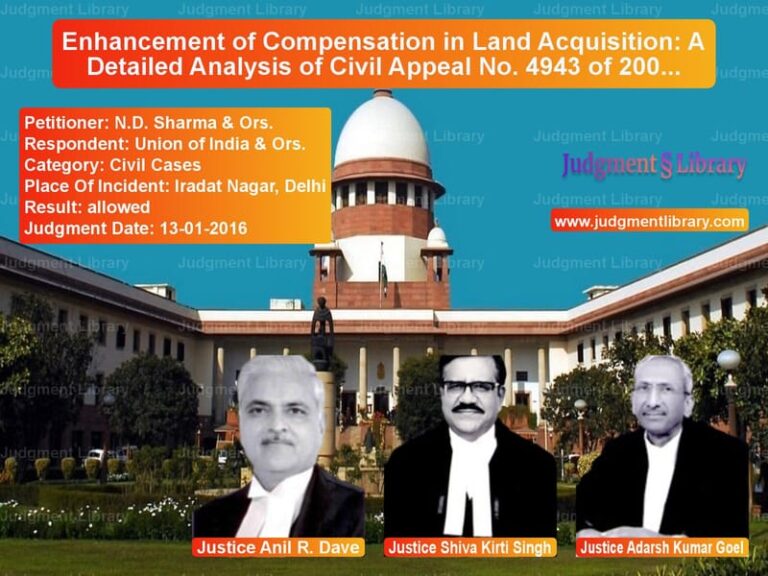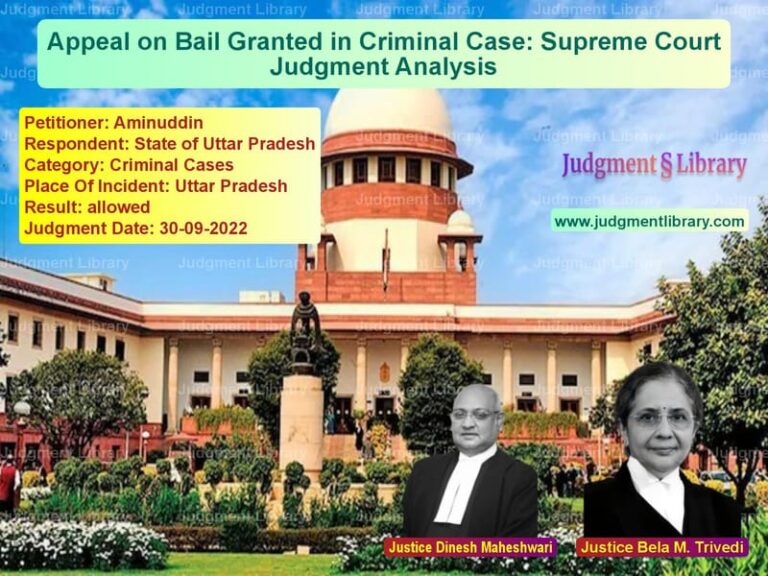Supreme Court Orders Conservation Measures for Endangered Great Indian Bustard
The Supreme Court of India has issued a landmark judgment in the case of M.K. Ranjitsinh & Ors. v. Union of India & Ors., emphasizing the urgent need for conservation measures to protect the endangered Great Indian Bustard (GIB) and Lesser Florican. The case was a public interest litigation (PIL) aimed at preventing the extinction of these species due to collisions with overhead power lines and habitat destruction caused by windmills and solar projects.
Background of the Case
The petitioners, environmentalists and conservationists, sought the Court’s intervention to mitigate the threats posed by infrastructure development in the birds’ natural habitats. They specifically requested the undergrounding of power lines in priority and potential GIB habitats, installation of bird divertors, and protection of breeding grounds from predators.
The Wildlife Institute of India (WII) had previously reported that power lines were a major cause of bird fatalities, estimating that nearly 100,000 birds die annually due to collisions. The study also highlighted that unless urgent measures were taken, GIB extinction was inevitable.
Petitioner’s Arguments
- The petitioners argued that the GIB population had declined drastically and that immediate conservation measures were necessary to prevent their extinction.
- They cited scientific studies showing that power lines were the leading cause of GIB deaths due to collisions.
- They requested a ban on new overhead power lines, the undergrounding of existing high-voltage lines, and the mandatory installation of bird divertors where undergrounding was not feasible.
- The petitioners also sought predator-proof fencing and controlled grazing in GIB breeding areas to improve survival rates.
Respondent’s Arguments (Union of India & State Governments)
- The Ministry of Power acknowledged that GIBs lacked frontal vision, making them vulnerable to power line collisions.
- The respondents argued that undergrounding high-voltage power lines was technically challenging and economically unfeasible due to high costs and maintenance issues.
- They contended that bird divertors were an effective alternative for reducing mortality without requiring undergrounding.
- They pointed out that existing conservation programs were already in place and that the issue required a balanced approach between conservation and energy needs.
Supreme Court’s Analysis and Judgment
The Court took into account multiple expert reports and past judgments emphasizing environmental protection. It noted that India’s constitutional and legal framework imposes a duty on the government to protect endangered species.
The Court referred to its previous ruling in Centre for Environmental Law, World Wide Fund – India v. Union of India, which emphasized ecocentric principles over anthropocentric approaches in conservation. The Court also cited the public trust doctrine, affirming that the government is a trustee of natural resources and must act in the best interests of biodiversity.
Key observations made by the Court:
- “Environmental justice could be achieved only if we drift away from the principle of anthropocentric to ecocentric.”
- “The State, as a custodian of natural resources, has a duty to maintain them not merely for the benefit of the public but also for the best interest of flora and fauna.”
- “We, as human beings, have a duty to prevent the species from going extinct and must advocate for effective species protection regimes.”
Directions Issued by the Court
After detailed deliberations, the Court issued the following directives:
- Undergrounding Power Lines: All future low-voltage power lines in GIB priority habitats must be laid underground.
- Retrofitting of Existing Power Lines: Overhead low-voltage power lines in critical areas must be converted to underground lines.
- Bird Divertors: In cases where undergrounding is not feasible, bird divertors must be installed on high-voltage lines to reduce collision risks.
- Protection of Breeding Grounds: GIB nesting areas must be fenced to protect eggs and chicks from predators.
- Funding and Cost Sharing: The State and Central governments were directed to allocate resources for conservation efforts, including leveraging corporate social responsibility (CSR) funds from power companies.
- Expert Committee Formation: A committee comprising scientists and conservationists was constituted to oversee the implementation of these measures.
Implementation Challenges and Future Outlook
While the judgment is a major victory for wildlife conservation, its implementation poses significant challenges:
- Technical Constraints: Undergrounding high-voltage lines is complex and may not be feasible in all terrains.
- Financial Burden: Retrofitting infrastructure requires substantial funding, and determining cost-sharing mechanisms between stakeholders is crucial.
- Monitoring and Compliance: Effective implementation will require coordination between multiple government agencies and private power companies.
Conclusion
The Supreme Court’s judgment marks a critical step in protecting India’s endangered bird species. By mandating undergrounding of power lines and other conservation measures, the Court has reinforced the country’s commitment to biodiversity conservation. However, the success of this initiative will depend on swift implementation, financial backing, and sustained monitoring.
This ruling serves as a precedent for balancing development with environmental conservation, ensuring that infrastructure projects do not come at the cost of biodiversity loss.
Petitioner Name: M.K. Ranjitsinh & Ors..Respondent Name: Union of India & Ors..Judgment By: Justice S.A. Bobde, Justice A.S. Bopanna, Justice V. Ramasubramanian.Place Of Incident: Rajasthan and Gujarat.Judgment Date: 19-04-2021.
Don’t miss out on the full details! Download the complete judgment in PDF format below and gain valuable insights instantly!
Download Judgment: m.k.-ranjitsinh-&-or-vs-union-of-india-&-ors-supreme-court-of-india-judgment-dated-19-04-2021.pdf
Directly Download Judgment: Directly download this Judgment
See all petitions in Environmental Cases
See all petitions in Judgment by S. A. Bobde
See all petitions in Judgment by A. S. Bopanna
See all petitions in Judgment by V. Ramasubramanian
See all petitions in allowed
See all petitions in supreme court of India judgments April 2021
See all petitions in 2021 judgments
See all posts in Environmental Cases Category
See all allowed petitions in Environmental Cases Category
See all Dismissed petitions in Environmental Cases Category
See all partially allowed petitions in Environmental Cases Category

